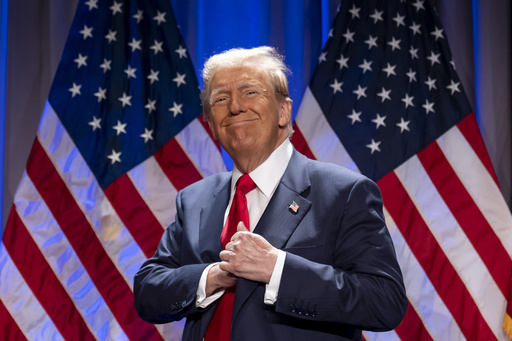UNITED NATIONS — The global community, including the United Nations and various international organizations, is preparing for the possibility of another four years under Donald Trump’s leadership. Trump previously criticized the United Nations as merely a venue for socializing, stating that it served as “just a club for people to get together, talk and have a good time” before he assumed the presidency for the first time.
During his initial term, Trump took significant actions against the U.N., including halting funding for its health and family planning initiatives, withdrawing the U.S. from UNESCO and the Human Rights Council, and imposing increased tariffs on both China and some U.S. allies, thus disregarding World Trade Organization rules. The United States remains the largest contributor to the U.N., funding 22% of its regular budget.
Trump’s approach toward the U.N. began to crystallize this week with the appointment of Republican Representative Elise Stefanik from New York as the U.S. ambassador to the organization. Stefanik has openly advocated for a comprehensive reevaluation of U.S. financial contributions to the U.N. and has called for discontinuing funding for the United Nations Relief and Works Agency for Palestine Refugees in the Near East (UNRWA). This action came after President Joe Biden paused financial support following UNRWA’s dismissal of staff members in Gaza who were linked to the October 7, 2023, Hamas attacks.
Speculation about Trump’s future policies concerning global organizations is already rife. Observers note that discerning Trump’s positions on key U.N. issues can be quite convoluted. For instance, while he has labeled climate change as a hoax and supported the fossil fuel sector, he has shown an alliance with environmentally conscious figures like Elon Musk. In his previous term, he notably accelerated efforts to develop a COVID-19 vaccine, even as he aligned with anti-vaccine proponents like Robert F. Kennedy Jr.
Richard Gowan, the U.N. director at the International Crisis Group, suggests that Trump’s stance on the U.N. lacks consistency. He remarks that Trump is likely to view the institution not as a forum for substantial political dialogue but as a stage to advance a conservative global social agenda. Historical precedence from his first administration supports this notion; for example, Trump withdrew the United States from the Paris climate agreement and has shown no interest in multilateral cooperation—an approach that U.N. Secretary-General Antonio Guterres has labeled as crucial to the organization’s mission.
The global landscape has shifted dramatically since Trump first entered office in 2017, with conflicts erupting in regions such as the Middle East, Ukraine, and Sudan, alongside the expansion of North Korea’s nuclear program and concerns surrounding Iran’s nuclear ambitions. The U.N. Security Council, with its existing divisions among influential members, has struggled to address these crises, undermining respect for international law across conflict zones.
John Bolton, a previous national security adviser during Trump’s first term, portrays the current global climate as a return to Cold War conditions. He asserts that nations like China and Russia provide cover for states such as Iran and North Korea, both of which contribute to regional instability. Bolton predicts that Stefanik will face considerable challenges in light of the multifaceted issues confronting the Security Council.
With Russia’s veto power impacting the Council’s effectiveness regarding the Ukraine crisis and U.S. backing obstructing a cease-fire resolution in Gaza, treatment of Israel remains a contentious topic. Gowan notes that Congressional Republicans are intensely frustrated with how the U.N. has criticized Israeli policies, and he anticipates that they will push Trump to implement drastic budget cuts to the U.N. in an effort to satisfy his voter base.
The operational aspects of global institutions are also clouded in uncertainty. In Geneva, where many U.N. agencies focus on human rights, migration, and climate, diplomats are cautiously optimistic, mentioning that Trump largely preserved humanitarian aid funding during his first term. Nonetheless, his unpredictable stance on trade—exemplified by his abandonment of WTO protocols and threats of tariffs against China—stands to significantly disrupt international commerce.
Experts suggest that Trump’s reentry into leadership could revive ideological confrontations, despite the built-in mechanisms within international frameworks designed to weather such fluctuating political tides. Highlighting Trump’s controversial victory at the recent U.N. climate conference, Guterres emphasized the inevitability of the clean energy transition. Meanwhile, Allison Chatrchyan, director of the AI-Climate Institute at Cornell University, expressed concerns that a Trump administration could lead to a revival of hesitance around U.S. involvement in critical agreements, like the Paris Accord.
Gian Luca Burci, a former legal counsel for the World Health Organization (WHO), cautions that Trump may adopt a more strategic rather than purely provocative approach in a potential second term. Should the U.S. sever its ties with the WHO, it would substantially weaken the health agency by stripping it of essential resources and expertise, creating significant ramifications for its operations.
Both Gowan and Bolton agree that one U.N. event Trump is unlikely to miss is the annual General Assembly gathering, where he has previously enjoyed tremendous visibility on the international stage.



